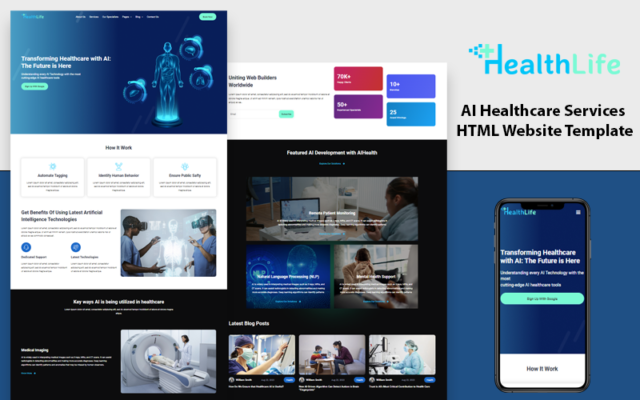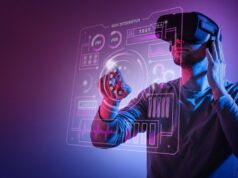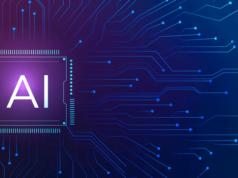Artificial Intelligence and Healthcare: A Promising Partnership
Artificial Intelligence has arisen as a distinct advantage in different businesses, and its effect on medical services is downright progressive. Lately, the mix of artificial intelligence into medical services frameworks has shown extraordinary commitment in changing the manner we analyze, treat, and oversee sicknesses. This imaginative association among man-made intelligence and medical care not just holds the possibility to work on persistent results yet additionally vows to smooth out regulatory undertakings, decrease expenses, and upgrade the general nature of medical care administrations. In this article, we will dig into the universe of simulated intelligence and medical services, investigating the various manners by which this collaboration is causing turn of events in the clinical field.
Diagnostics and Disease Detection
One of the main commitments of artificial intelligence to medical care is its ability in diagnostics and illness detection. Artificial intelligence frameworks are being prepared to dissect clinical pictures, for example, X-ray, CT scan, and MRI’s, with surprising precision. These frameworks can identify abnormalities and examples that may not be apparent to the natural eye, empowering early conclusion of different ailments.
For example, artificial intelligence driven calculations have exhibited remarkable exactness in distinguishing breast cancer from mammograms. By investigating huge number of mammograms and gaining from the information, computer based intelligence can distinguish anomalies and possibly dangerous injuries with high accuracy. Such early identification can prompt convenient intercession and fundamentally work on a patient’s possibilities of endurance.
Besides, artificial intelligence has shown guarantee in the distinguishing proof of diabetic retinopathy by looking at retinal pictures. Diabetic retinopathy, a typical case of diabetes, can prompt visual deficiency whenever left untreated. Artificial intelligence can rapidly and precisely distinguish the illness’ seriousness, taking into consideration convenient treatment and forestalling irreversible vision misfortune.
Personalized Treatment Plans
AI’s capacity to process and dissect huge measures of patient information can possibly transform the manner in which treatment plans are created. With artificial intelligence AI calculations, medical services suppliers can fit therapy techniques to individual patients, considering their novel hereditary cosmetics, clinical history, and reaction to past therapies.
On account of tumor growth, for instance, artificial intelligence can separate a patient’s genomic information to distinguish explicit hereditary transformations liable for the sickness. This data can help oncologists in choosing the best designated treatments, limiting aftereffects, and further developing treatment results. Moreover, AI can persistently screen a patient’s reaction to treatment and make continuous changes, upgrading the treatment for the most ideal result.
Predictive Analytics
Artificial intelligence can anticipate medical services patterns and possible flare-ups by breaking down information from different sources, for example, electronic wellbeing records, social media, and general wellbeing data sets. This capacity is significant in sickness counteraction, as it permits medical care associations to generate assets according to the arising health dangers.
During the Coronavirus pandemic, artificial intelligence assumed a basic part in following the spread of the infection, distinguishing areas of interest, and foreseeing medical care asset necessities. AI models handled information on disease rates, hospitalizations, and populace versatility to give continuous bits of knowledge to medical services specialists, empowering them to pursue informed choices and deal with the emergency.
Notwithstanding pandemic reaction, artificial intelligence can assist with overseeing chronic circumstances by anticipating illness intensifications. For patients with conditions like asthma or diabetes, AI driven calculations can break down authentic information and ecological variables to gauge when side effects might deteriorate. Patients and medical services suppliers can then go to proactive lengths to forestall complexities and hospitalizations.
Drug Discovery and Development
The course of medication revelation and improvement is an extended and exorbitant undertaking, frequently requiring years and billions of dollars to put up another drug for sale to the public. Artificial intelligence can possibly speed up this interaction by distinguishing potential medication competitors, anticipating their adequacy, and improving clinical preliminary plans.
By breaking down huge datasets of substance compounds, artificial intelligence can recommend potential medication contender for different infections. AI models can likewise reproduce the way of behaving of these mixtures in the human body, giving bits of knowledge into their viability and possible aftereffects. This approach soothes out the medication disclosure process, decreasing the time and assets expected to carry new medicines to patients.
Artificial intelligence can likewise aid clinical preliminary enlistment and plan. By breaking down tolerant records and clinical writing, artificial intelligence can recognize appropriate possibility for clinical preliminaries and suggest ideal preliminary conventions. This facilitates the preliminary cycle as well as guarantees that the review incorporates a more different and delegate patient populace.
Administrative Efficiency
AI’s clinical application is changing the regulatory parts of medical care. Undertakings that were once tedious and inclined to errors can now be mechanized, permitting medical services experts to zero in on understanding consideration.
Artificial intelligence chat-bots and virtual helpers are being utilized to deal with patient requests, arrangement booking, and billing requests. These computers based intelligence solutions can be provided as every day support, lessening the responsibility on managerial staff.
Moreover, artificial intelligence can aid clinical coding and billing processes. By investigating clinical records and treatment codes, artificial intelligence can guarantee precise bills, diminishing the gamble of mistakes and medical services misrepresentation. This soothes out monetary activities as well as assists medical care associations keep up with consistence with administrative necessities.
Telemedicine and Remote Monitoring
The coordination of computer based intelligence into telemedicine and remote checking has become progressively significant, particularly with regards to the Coronavirus pandemic. Artificial intelligence driven telehealth podiums empower medical services suppliers to offer virtual counsels and screen patients from a distance, guaranteeing progression of care while lessening the gamble of infection transmission.
Artificial intelligence can uphold telemedicine by giving constant information during virtual arrangements. For example, AI calculations can dissect a patient’s important bodily functions and side effects, assisting medical services suppliers with pursuing informed choices and proposals. This innovation is especially significant for patients with constant circumstances or those in distant regions who might have restricted admittance to in-person care.
Remote checking, with the help of computer based intelligence, permits medical care experts to keep a nearby watch on patients with constant circumstances. Wearable gadgets furnished with artificial intelligence can consistently follow essential signs, distinguish irregularities, and ready medical care suppliers to expected issues. This proactive methodology can prompt early intercession and worked on quiet results.
Ethical and Regulatory Considerations
While the association among artificial intelligence and medical care holds colossal commitment, it likewise raises moral and administrative difficulties. Guaranteeing patient protection and information security is foremost. Medical care associations should lay out vigorous information security measures to defend patient data and conform to pertinent guidelines, for example, the accountability act (HIPAA).
Moreover, straightforwardness in artificial intelligence calculations and dynamic cycles is significant. Patients and medical services suppliers ought to have the option to comprehend and trust the simulated intelligence driven proposals and determinations. Administrative bodies assume a crucial part in creating rules and principles for AI in medical care to guarantee the capable and moral utilization of these innovations.
Conclusion
The association between Artificial Intelligence and medical care is irrefutably promising. Computer based intelligence is changing diagnostics, customizing treatment plans, anticipating medical services patterns, speeding up drug disclosure, improving authoritative treatment plans, and empowering telemedicine and remote observing. These headways can possibly work on tolerant results, diminish costs, and change how medical care is conveyed.
In any case, as artificial intelligence keeps on reshaping the medical care scene, moral contemplations and administrative systems should keep pace. Patient protection, information security, straightforwardness, and mindful artificial intelligence use ought to be at the very front of this change.
As we plan ahead, the coordinated effort among artificial intelligence and medical services holds the possibility to save lives, increment admittance to quality medical care, and usher in another period of clinical development. This association isn’t just encouraging yet additionally basic intending to the developing medical services difficulties within recent memory.








